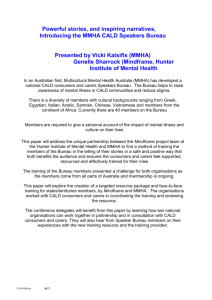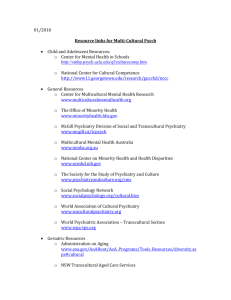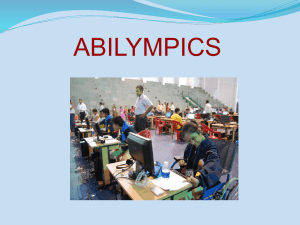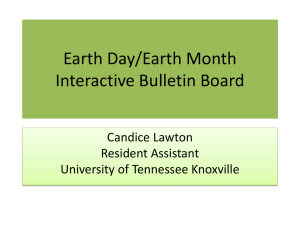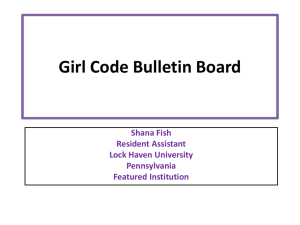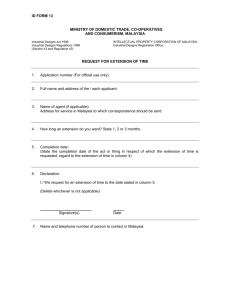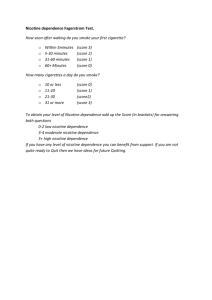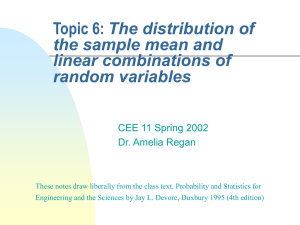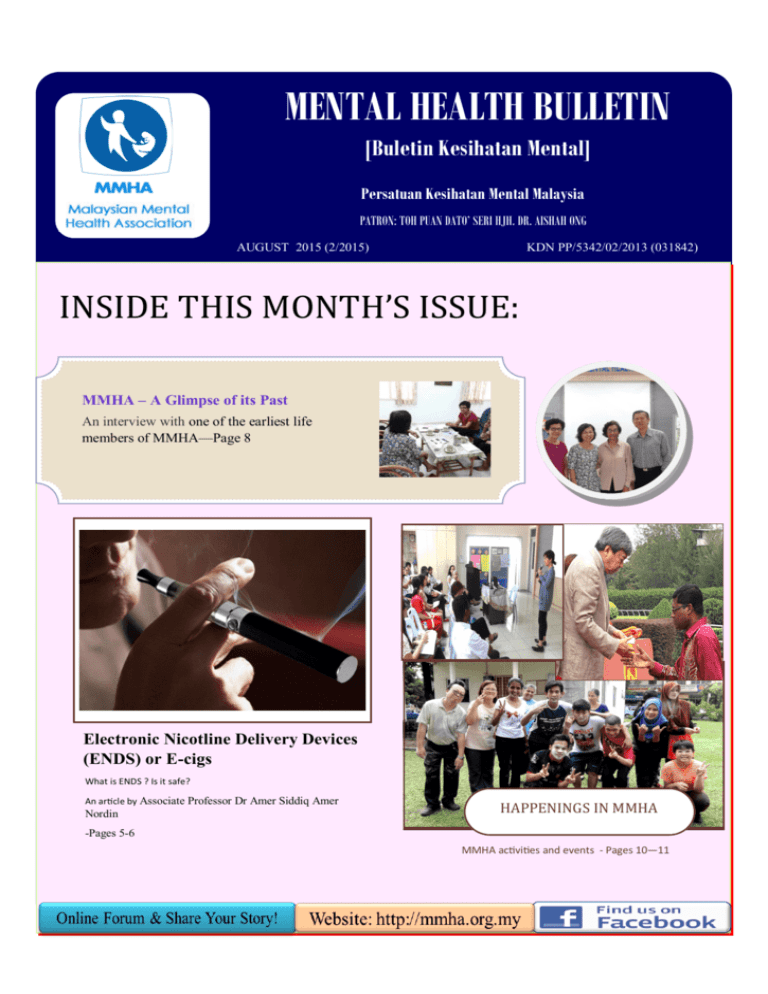
MENTAL HEALTH BULLETIN
[Buletin Kesihatan Mental]
Persatuan Kesihatan Mental Malaysia
PATRON: TOH PUAN DATO’ SERI HJH. DR. AISHAH ONG
AUGUST 2015 (2/2015)
KDN PP/5342/02/2013 (031842)
INSIDE THIS MONTH’S ISSUE:
MMHA – A Glimpse of its Past
An interview with one of the earliest life
members of MMHA—Page 8
Electronic Nicotline Delivery Devices
(ENDS) or E-cigs
What is ENDS ? Is it safe?
An article by Associate Professor Dr Amer Siddiq Amer
Nordin
HAPPENINGS IN MMHA
-Pages 5-6
MMHA activities and events - Pages 10—11
MMHA MENTAL HEALTH BULLETIN Aug. 2015 Issue 2/ 2015
1
CONTENTS:
President’s message
Pg 3-4
Music for Mental well-being
by Lum Khay Xian
Pg 4
Electronic Nicotine Deliver
Devices
by Dr Amer Siddiq Amer Nordin
University Malaya Centre of Addiction
Sciences (UMCAS)
Pg 5-6
Q and A on Substance Abuse
by Dr.Anne Yee and Assoc. Prof.
Dr. Ng Chong Guan (UM, UMMC)
Pg 6-7
MMHA – A Glimpse of its Past
by Datin Dr Ang Kim Teng
Caring for the Future of Loved
Ones with Serious Mental Illness
- Dato’ Dr Yaacob Hussain Merican &
Mdm. Ong Su-Ming
Happenings in MMHA
EDITORIAL
Advisor
Datin Dr. Ang Kim Teng
Pg 8
Editor
Pn. Fazlin Badri
Pg 9
Assistant Editor
Lum Khay Xian
Pg10-11
Editorial team
Sponsorship form
Dr. Eileen Nadarajah
Nurhijjah bt. Mat Zin
Santa Kumarie
Chin Chi Onn
Pg 12
MMHA Management Committee
Committee Members :
1.
2.
3.
4.
5.
6.
1.
2.
3.
4.
5.
6.
7.
President
Dep. President
V. President (1)
V. President (2)
Hon. Sec. Gen.
Hon. Treasurer
- Mr. See Cheng Siang
- Dato’ Dr. Andrew Mohanraj
- Mdm. Poh Kim Pheng
- Dr. Ng Chong Guan
- Datin Dr. Ang Kim Teng
- Mdm. Lee Siew Bee
Dr. Eileen Nadarajah
Dr. Anne Yee
Dr. Ivan Thomas
Pn. Fazlin Badri
Mr. Harp Singh
Datin Seri Aleena Abdullah
Mdm. Mala T. Davi
Publisher:
Malaysian Mental Health Association, MMHA Office: 8 Jalan 4/33, off Jalan Othman, 46050 Petaling Jaya
Telephone: 03 7782 5499, 03-77825499 , Fax: 03-7783 5432 , Email: admin@mmha.org.my Website : http://mmha.org.my/
All rights reserved. Requests for bulletin or permission to reproduce or translate MMHA Mental Health bulletin – whether for sale
or for noncommercial distribution – should be addressed to MMHA as above. Views expressed by the individual authors may not
necessarily reflect that of MMHA. MMHA does not warrant that the information contained in this publication is complete and
correct and shall not be liable for any damages incurred as a result of its use.
MMHA MENTAL HEALTH BULLETIN Aug. 2015 Issue 2/ 2015
2
PRESIDENT’S MESSAGE
MMHA held its 40th Annual Gen-
Although psychiatric service is now available in many gov-
eral Meeting last May although it
ernment hospitals and in the private sector, service for the
has been 47 years since its official
mentally ill is more than psychiatric treatment. Some ill-
th
registration on 30 July 1968. This
nesses will benefit from supportive psychotherapy and
gap in the history of MMHA may
counseling. However, this is very lacking in government
be interesting to explore further.
hospitals (except university hospitals) and not many can
afford such expensive therapies in the private sector.
It has been a long journey since its establishment. The
MMHA will be providing psychotherapy service in a small
founding members would have been proud that they had
way starting this August. This service can be expanded if
left a legacy that is even more needed today, as mental
there is sufficient funding.
health becomes an increasingly important health concern.
When MMHA was first established, it was to provide sup-
We want to thank our donors from among the public, corpo-
port and rehabilitation to patients who were discharged
rations and the Government (Ministry of Health Malaysia
from the hospital for serious mental illness. Today, the
and Social Welfare Department) for the grants provided to
role of MMHA has gone beyond serving the mentally ill,
us. We will strive to do our best to provide better service for
but encompasses caregivers, the local community and gen-
those who need them, and to work with the Ministry of
eral public as a whole. It is also beyond providing psycho-
Health to promote better mental health for people in Malay-
social rehabilitation to those recovering from serious men-
sia.
tal illness, but also towards caregiver and public education,
promoting mental wellbeing as well as advocacy for the
mentally ill.
会长的讯息
虽然马来西亚精神健康协会(MMHA) 注册于1968年7月
30日, 成立至今已有47年, 然而MMHA于今年五月
召开的却是第40周年年度会员大会, 在MMHA的历史上
这一差距是值得我们进一步探索的。
MMHA成立至今可谓是一次漫长的旅程。随着人们越来
越重视精神健康,我们协会的创办人应该为他们所留下
在现今社会中更被重视的遗产而感到骄傲与自豪。在
MMHA成立之初,它是为提供刚出院的精神病患者辅助
及协助他们朝复原之路前进。今时今日,MMHA所扮演
的角色不仅限于协助与为精神病患者服务,而也延伸至
精神病患的照护者、当地社区居民及民众。此外,
MMHA除了提供精神病患者康复护理服务,同时也给予
精神病患者的照护者及大众精神健康方面的教育,促进
精神健康以及提倡与维护精神病患者的权益。
Mr. See Cheng Siang,
President,
Malaysian Mental Health Association
尽管许多政府医院及私人诊所已有提供精神病治疗服务,
但精神病患者所需要的服务却不仅是精神疾病药物治疗。
事实上,有些精神疾病患者也透过辅助性心理治疗及辅导
获益良多,进而让病情好转。然而,除了教学医院之外,
许多政府医院都缺乏心理治疗及辅导支援,而且只有少数
人能负担得起私人诊所昂贵的心理咨询费用。因此,
MMHA将于今年八月开始提供心理治疗。 若有足够的资
金,我们将扩充此服务。
在此,我们衷心感谢大众、各公司与政府(马来西亚卫生
部及社会福利部)的捐助。我们会尽心尽力地向有需要的
人伸出援手及提供更完善的服务,并与政府携手合作以提
升马来西亚人民的精神健康。
Mr. See Cheng Siang
会长,
马来西亚精神健康协会
MMHA MENTAL HEALTH BULLETIN Aug. 2015 Issue 2/ 2015
3
PERUTUSAN PRESIDEN
MMHA telah mengadakan mesyuarat Agung tahunan
yang ke-40 pada penghujung Mei yang lalu walaupun
ianya telah ditubuhkan secara rasmi sejak 47 tahun lalu
pada 30 July 1968. Jurang yang wujud adalah sejarah
yang perlu dikaji lanjut.
Persatuan ini telah lama ditubuhkan.
Kumpulan
pengasas MMHA pasti sangat berbangga dengan legasi
yang telah mereka tinggalkan, yang mana isu kesihatan
mental menjadi makin penting di masyarakat. Pada
awal penubuhan MMHA, tujuan utama adalah untuk
menyediakan sokongan dan pemulihan kepada pesakit
mental yang telah keluar dari hospital kerana penyakit
mental yang serius. Masa kini peranan MMHA telah
melangkaui bukan sahaja menyediakan perkhidmatan
kepada pesakit bahkan memberi bertumpukan kepada
penjaga, masyarakat setempat dan seluruhnya. Ia juga
melangkaui perkhidmatan psikososial kepada pesakit
yang dalam proses pemulihan tetapi pendidikan kepada
penjaga pesakit dan masyarakat, membantu selia pencarian kerja klien, mempromosi kesejahteraan mental
dan juga memperjuangkan hak pesakit mental.
Walaupun perkhidmatan psikiatrik disediakan di kebanyakan hospital kerajaan dan klinik swasta, perkhidmatan bagi pesakit mental seharusnya tidak hanya ter-
tumpu sekadar rawatan semata. Sesetengah pesakit akan
menerima lebih manfaat daripada sokongan psikoterapi
dan kaunseling. Walaubagaimanapun perkhidmatan ini
masih kurang di hospital kerajaan (kecuali hospital universiti) dan kebanyakkan orang mungkin tidak mampu
untuk mendapatkan perkhidmatan yang mahal ini dari
sektor swasta. MMHA akan menyediakan sesi psikoterapi pada skala kecil sebagai permulaan bermula pada
Ogos ini. Perkhidmatan ini boleh dikembangkan lagi
bergantung kepada kedudukan kewangan dan sokongan
penderma.
Kami ingin mengucapkan terima kasih kepada dermawan dari kalangan orang awam, pertubuhan dan juga
pihak Kerajaan ( Kementerian Kesihatan dan Jabatan
Kebajikan Masyarakat) dengan sejumlah geran yang
diberikan. Kami akan terus berusaha untuk memberikan
perkhidmatan yang lebih baik untuk mereka yang memerlukan, serta bekerjasama dengan pihak Kementerian
Kesihatan untuk mempromosi kesihatan mental yang
lebih baik untuk Masyarakat di Malaysia.
Encik See Cheng Siang,
Presiden,
Malaysian Mental Health Association
Music for Mental Well-Being
Music has been an important component of life across
different cultures, but do you know that music could
be used as a medium to achieve therapeutic goals in
mental health?
The monthly public education talk, Music in Mental
Health, was given by Dr. Indra Selvarajah, a music
therapist and lecturer from the Music Department of
University Putra Malaysia, on 27th June (Sat) in
MMHA. About 40 people attended the talk, which
was very interactive with many questions from the
audience.
Dr. Indra gave a brief introduction on how music
therapy is aligned with primary psychiatric treatment. She also provided an insight on how music can
be used in mental health as an alternative to sedative
medication, stabilizing one’s thoughts and emotions
as well as stimulating an individual’s interest and
engagement in activities.
The talk has indeed broadened the audience’s horizon and deepened their understanding towards the
therapeutic use of music in promoting mental health.
Given that recent emphasis in mental health care on
‘coping with’ rather than ‘curing’ mental disorder,
the exploration of healthier and more positive use of
music in promoting mental health would continue to
benefit the community.
Submitted by:
Lum Khay Xian
MMHA MENTAL HEALTH BULLETIN Aug. 2015 Issue 2/ 2015
4
Electronic Nicotline Delivery Devices (ENDS) or E-cigs
Associate Professor Dr Amer Siddiq Amer Nordin
Of late, there has been much ado about ENDS being discussed
in both social media and also mainstream newspapers and
magazines. Some of the news have been about the positive use
of these devices as a method to quit smoking whilst others
touch upon the dangers of using these devices. Which of the
two is the real news? Are they safe to be used on their own or
as an option to quit smoking? What are the harms of ENDS?
Should we be worried? Should the relevant authorities do
something about this ‘menace’ before it is too late?
What is an ENDS?
ENDS are electronic delivery devices which deliver nicotine
to the user. These devices have three main elements – a
mouthpiece, a heating element normally attached with a battery and reservoir to store the nicotine or flavored solution
known as e-juice. When the user sucks onto the mouthpiece,
the suction behavior causes the reservoir containing the e-juice
to make contact with the heating element to release a mist
known as vape. Vapes are not smoke as there are no combustibles in an ENDS but are a mist of heated e-juice.
Can they be used to quit smoking?
For the record, in Malaysia there are no ENDS that have
been approved to be used as quit smoking devices. In other
countries, ENDS have been touted as a replacement for cigarettes and a potential quit smoking aid, but have not been
approved for the latter.
The main issue with ENDS are that they are not regulated as
medical devices and therefore cannot be promoted as a quit
smoking aid. Without regulation in its current form, e-juices
are not subject to any form of quality control; therefore,
both the dose of nicotine present in the liquids and the stability of its content when heated up have yet to be quantified
and verified.
At present, two studies have looked at the use of ENDS as a
quit smoking aid. Both efforts are hopeful indicatives, however, they were small in participants and the devices used
are now obsolete. Therefore, we are not yet at liberty to recommend or suggest the use of ENDS as a quit smoking aid.
(Refer to the picture below)
Are they safe?
This is a contentious issue and source of much debate. As
we have highlighted earlier, these products are unregulated
and therefore do not go through the normal check-andbalance of regulation. As a result, the onus on using is
passed to individual users.
To date, a recent Cochrane review of current evidence on
safety was inconclusive on its safety to health in the long
term, however, current evidence suggest that they are safe
in the short term. The use of propylene glycol in ENDS has
been the main safety concern as the effects of inhaling this
product to the lungs is unknown. There are studies that
have found toxins to still be present in ENDS, though their
concentration is significantly lower compared to conventional cigarettes.
… Continues next page
MMHA MENTAL HEALTH BULLETIN Aug. 2015 Issue 2/ 2015
5
….. Continued from previous page.
Should we be worried?
Nicotine is the mainstay of addiction towards cigarettes.
Nicotine is found in tobacco and was traditionally introduced to individuals through smoking cigarettes, waterpipes, cigars or pipes. In a small number of individuals, it
was introduced through chewing of tobacco. With the introduction of ENDS, we are now faced with a new problem of
nicotine introduction, a problem we did not previously have.
Of specific concern is the growing use of ENDS among
children. As it is not yet regulated in Malaysia, there are no
specific laws to prohibit the use or selling of ENDS to minors. Thus, nicotine can potentially be introduced to children through this explicit loophole. Also, ENDS users have
the choice to introduce greater quantities of nicotine on each
use. E-juices are often sold with higher nicotine content
compared to conventional cigarettes, although their absorption is comparable to conventional cigarettes as nicotine
delivery is less efficient through vaping in contrast to combusting tobacco.
It is important to note however, that nicotine is a class C poison and is regulated through the Malaysia Poison Act in Malaysia. Sellers of nicotine are committing a crime by selling
without a permit and can be charged for this offence.
Yes. In my opinion, we definitely should. In fact, considering the many uncertainties presently available, we should be
especially worried about the growing trend of ENDS in Malaysia. There appears to be little directive on its use at present; thus, the relevant authorities need to act and act swiftly
in regulating these products. In particular, should they not be
banned, they need to be regulated similarly to cigarettes
whereby selling to minors and vaping in public is not allowed. They also need to undergo thorough product safety
checks to prevent unwanted incidents. As it is, a number of
reports have surfaced on END devices blowing up on their
users causing burns towards the oral mucosa and facial regions. More recently, there are newer reports of users using
the END devices to heat other substances of abuse such as
cannabis and amphetamines.
Dr Amer Siddiq Amer Nordin
University Malaya Centre of Addiction Sciences (UMCAS)
Asso. Professor, Consultant Psychiatrist and Addiction Medicine Specialist
Coordinator, Nicotine Addiction Research & Collaborating Centre, UM
Smoking Cessation Specialist, Fellow, Yongin WHO Collaborating Centre
(Psychosocial Rehabilitation) ,Doctor of Philosophy Student (National
Addiction Centre, University of Otago, Christchurch)
Q & A ON SUBSTANCE ABUSE
By Dr. Anne Yee and Assoc. Prof. Dr. Ng Chong Guan (UM, UMMC)
Q1. What are the substances that people abuse in Malaysia?
The most common is Tobacco use. In Malaysia, the
prevalence of smoking among men, according to the
Global Adult Tobacco Survey 2011, is more than 40%.
That means that for every two Malaysian men, one will
be a smoker. Every year, 20,000 Malaysians die due to
smoking related diseases such as lung cancer and
cardiaovascular diseases. Many more are left with a
whole range of health morbidities due to their smoking
habit. More recently, there is increasing concern on the
environmental harm of smoking.
Others common substances use by Malaysians are alcohol, cannabis, opioid, methamphetamine, amphetamine,
designer drugs, ecstasy, benzodiazepine (sleeping pills)
and inhalants (glue).
2. When does a substance use become an abuse ?
A person is said to suffer from substance use disorder
when he or she has a maladaptive pattern of substance use
over a period of time (12 months or more), with at least
one of the following characters:
Use large amount of the said substance, or for a prolonged
duration without successful attempt to cut down or control
its use
Great deal of time spent in obtaining or using the substance
Crave for the substance
Unable to fulfill their duties (work, school, home)
Encounter social or interpersonal problems caused by
substance use
Give up usual social, occupational or recreational activities
Tolerance (larger amount of the substance needed to
achieve the same effect)
Withdrawal (physical or psychological discomfort after
abrupt discontinuation of the substance use)
The disorder is deemed more severe when the person experiences more symptoms as mentioned above.
… Continues next page
MMHA MENTAL HEALTH BULLETIN Aug. 2015 Issue 2/ 2015
6
….. Continued from previous page.
3. Why does one develop substance use disorder?
Over the years, there are many conceptual models to
explain the development of substance use disorder. Currently, the most acceptable model is the Bio-psychosocial model.
In this model, substance abuse is seen from a broader
manner, which includes biological, psychological and
social factors. Substance use leads to various biological
responses in the body that account for the tolerance and
withdrawal side effects. Psychological factors such as
lack of self-control, emotional turmoil and negative
thoughts play a role in the formation of substance use.
Lastly, social factors like work stress, peer pressure or
peer influences are among other risk factors. The Biopsycho-social-spiritual model includes the spiritual
component. This is a more holistic model that places
emphasis on all areas essential to the development of
personal well-being and integration.
4. What are some of the tests to detect substance
abuse ?
Medical detection – urine analysis can detect the pres
HAVE YOU SUBMITTED YOUR STORY ?
Don’t Miss Out on the Prizes !
SHORT ESSAY COMPETITION in conjunction
with World Mental Health Day 2015
ence of certain drugs. Other methods include the use of
breath analyzer and toxicology analysis of hair samples.
Screening questionnaires such as CAGE, AUDIT (for alcohol), FTND(for tobacco use) and ASSIST (for all substances)
5. What are the treatment options for substance use disorder?
The treatment of substance use disorder involves a biopsycho-social approach, which is similar to the treatment
model for any other illnesses. There is an array of medical
(biological) treatments available for all types of substance
abuse, among the commonest one is Champix for smoking
cessation. In the instances of substance related psychosis or
mood disorder, antipsychotics, antidepressants or mood
stabilizers are usually prescribed. Psychotherapy such as
relapse prevention, motivational interview and cognitive
behavioural therapy (CBT) are crucial in the management
of substance use disorder. Last but not least, social intervention and support also play a crucial role in the treatment
of substance use disorder, for example, Alcohol Anonymous, which is a peer support for alcohol abuser.
2-Day Intensive Course
3½-Day Caregiver Education Course
FREE
MMHA conducts both these courses from time to time.
Tell your story about your struggle with
mental ill-health or your experience caring for someone close to you with mental illness. The story should be aimed at
creating better awareness on early
recognition of the illness, on educating
the public to be more positive in their
attitudes towards mental illness, to dispel misconceptions/
stigmas related to mental illness or to inspire hope for those
who are mentally ill or their caregivers.
First Prize - RM 3,000.00
Second Prize – RM 1,000.00
3rd to 5th Prize – RM 500.00
Submission of essay
Essay shall be submitted together with a competition form
which will be available online (mmha.org.my)
Closing Date : 15 Sept 2015.
Find out more on the Rules of Competition.
Check out at mmha.org.my, or call MMHA
Tel : 03-77825499
Currently, the 3½-day course is running, starting on 8th August, and continues on 15th, 22nd and 23rd Aug. (English)
The 2-day intensive course for Non-Caregivers will be on
12th & 13th September (English).
Another 3½-day course in mandarin will be conducted in
Oct (end) to Nov. 2015.
Register early if you are interested. Limited place available. Please call MMHA or email to register.
COURSE CONTENT
Lesson 1: Introduction, riding the emotional journey
Lesson 2 : Understanding Schizophrenia Illness
Lesson 3 : Mood and Anxiety Disorders
Lesson 4 : The Brain and mental illness
Lesson 5 : Medication and compliance
Lesson 6 : Communications - I, You Communications
Lesson 7 : Handling Crisis
Lesson 8: Recovery from Mental Illness
Lesson 9 : Empathy Workshop (3½-day course)
Lesson 10 : Problem Solving (3½-day course)
Lesson 11 : Self Care for your wellbeing (3½-day course)
Lesson 12 : Advocacy
MMHA MENTAL HEALTH BULLETIN Aug. 2015 Issue 2/ 2015
7
MMHA – A Glimpse Of Its Past
Datin Susheila McCoy, one of the earliest life members
of MMHA and in her eighties decided to attend
MMHA’s 40th Annual General Meeting on 24 May
2015. It was a pleasant surprise when she introduced
herself at the end of the meeting, and this led us to reconnect with our past - on how MMHA was established.
Tan ES had migrated to Australia many decades ago.
Hence, this preliminary reconstruct from Datin Susheila, a colleague and close associate of Ms. Sushama in
UH, who used to be actively involved in MMHA during its early days
From what we gathered, the initial idea of forming
MMHA was to cater for the needs of patients with serious mental illness who were discharged from the
University Hospital. Day rehabilitation service was not
started until several years later. Service for mentally ill
persons were provided by volunteers during weekends. MMHA operated from rented premise and shifted several times until it moved into its own premise in
2000.
According to Elsie, another medical social worker and
current President of the Malaysian Medical Social
Workers Association, one of the challenges faced by
the Association was lack of people willing to join the
Committee, or to lead the Organisation. This is understandable due to the stigma associated with mental
illness, and mental health work is not as glamorous as
some other Organisations.
We (President and Secretary General) met up with Datin
Susheila and Ms. Elsie Lee, a past president (1996/98)
recently to find out more about MMHA’s early years.
Unfortunately, records on the history of MMHA could
not be found, probably lost in the process of several relocations of the office in the past, or destroyed by termite
infestation during a period of time. The meeting was a
first attempt to reconstruct the history of MMHA. More
time is needed to check out on the work of MMHA in
the early days from the Archives of the Registrar of Societies, and tracing those who were involved in the work
of MMHA in those days.
The founding of MMHA
was a direct result of the
opening of the University of
Malaya (UM) University
Hospital (UH) in 1968. According to Datin Susheila,
two people were instrumental in the establishment of
MMHA. They were Professor Dr. Tan Eng Siong, from
the Psychiatric Department of MU’s Medical Faculty
(established in 1964), as well as Ms. P.C. Sushama, a
pioneer medical social worker in UH. Both worked together to lay the ground work for the formation of
MMHA in 1967 and its official registration on 30th July
1968. It is unfortunate that both were not available to
obtain further details on MMHA. Ms. Sushama passed
away in April last year (2014), while Prof.
MMHA has certainly grown in strength with the support of more people other than psychiatrist and medical related professionals. A number of caregivers have
joined the Committee and are actively contributing to
its growth. Donations from the public and grants from
the Government and Corporate sector have enabled
MMHA to employ full-time staff to manage the Organisation professionally. MMHA’s psychosocial rehabilitation service is ISO certified since 2007 and a
half-way home, on an adjacent building, was opened in
December 2012.
MMHA will be celebrating its Golden Jubilee in 2018.
We will piece together more details on the early days
of MMHA in time for the occasion. This article then,
is just a glimpse of the past. We wish to record our
thanks to Datin Susheila and Elsie for providing us
with some initial information on the formation of
MMHA. We are also thankful to the founders of
MMHA for their initiative and foresight. We will continue with the legacy and make MMHA the leading
Mental Health NGO in Malaysia as envisaged by the
founders.
Story contributed by :
Datin Dr. Ang Kim Teng
MMHA MENTAL HEALTH BULLETIN Aug. 2015 Issue 2/ 2015
8
Caring for the Future of Loved Ones with Serious Mental Illness - Forum
MMHA held a very interesting forum on Managing the Future of People with serious Mental Illness on 25th July. The
topic was specifically chosen to address concerns of caregivers who worry about who would take care of their loved
ones in the eventuality of their demise . The session was
chaired by Dato’ Dr. Andrew Mohanraj, Deputy President
of MMHA
Dato’ Dr. Yaacob Hussain Merican, a consultant and advisor to an established legal firm in Kuala Lumpur, as well as
secretary-general to the Kuala Lumpur Foundation to Criminalise War (KLFCW), spoke on legal planning to manage
the future of persons incapacitated by mental illness.
Madam Ong shared on
how she purposefully
planned and got her son
to be involved in real
life activities to make
him independent should
she be incapacitated or
not around one day. It
include :
Getting him to be responsible for some basic needs e.g.
buying provisions from the neighbourhood shop, picking
up groceries from the supermarket, making muesli for
breakfast, and so on.
Taking over more and more domestic responsibilities, in
all the tasks that keep a household going smoothly.
Handling his personal administration : medication, appointments, filing of records.
Handling money, banking affairs.
Getting him involved in social projects she organized
More recently, to be involved in end-of-life matters like
accompanying her to attend funerals of close friends.
Mdm. Ong Su-ming, a caregiver and Chairperson to KAMI
(2003-2013), a Family Support NGO from Ipoh, shared on
practical steps to prepare her son to be independent besides
taking care of his future financial needs.
Dato’ Yaacob emphasized the need for preventive planning
for the future. He spoke on establishing an Enduring Power
of Attorney that allows the caregiver to plan ahead and have
a machinery in place to care for the loved one when the
caregiver is no longer capable of doing so himself/herself.
This could be in relation to financial affairs, estates, and
others.
The forum continued with a Q & A session where many interesting questions were posted to the speakers. Due to time
factor, the details of making a Power of Attorney and will
could not be discussed. It was felt that a separate session on
the issues be organized to deliberate on this further. Overall,
the session had been very useful to the audience where more
than 50 people turned up.
He also spoke on the importance of making a Will that is a
legal document in which the caregiver declares his/her wish
for the loved one and the distribution of his/her estate when
he/she dies. He went on to explain the manner of estate distribution by law if there is no will, for Muslims and nonMuslims.
On the execution of the will and the execution on the Power
of Attorney, options include setting up of trustee to manage
the estate on behalf of the loved one from among close and
trusted family members. Alternatively, there are professional 3rd party trustees that can be engaged to manage the estate
and finances on behalf of the loved one.
[Explanatory note : A Power Of Attorney is a legal document that
gives another person legal power to make personal decisions on
your behalf. A Trustee, on the other hand, is a person or company
appointed in a trust document to manage and disburse trust property].
MMHA MENTAL HEALTH BULLETIN Aug. 2015 Issue 2/ 2015
9
Happenings in MMHA
16th of June, Datin Dr. Ang gave a talk on Stress and Mental
Wellbeing to the staff of Berjaya Times Square Hotel.
Visit to Hospital Permai Tampoi on the 8th of
June. The committee members in the picture
from left - Datin Aleena, Mr. See (President),
Dr. Ang & Mdm. Poh Kim Pheng
Fun outdoor activities with our clients and interns
A catch up with Mdm. Elsie Lee (our past president in
1996/98) and Datin Susheila, the earliest life member of
MMHA.
A big thank you to the students from Taylor’s
Lakeside Campus who came and delievered a
generous donation to MMHA.
MMHA MENTAL HEALTH BULLETIN Aug. 2015 Issue 2/ 2015
10
Happenings in MMHA
A Day trip to Putrajaya with Mr. Ong Su Ming and Mrs
Muller, our volunteers, on the 14th of May.
Our vice president, Mdm. Poh Kim Pheng was
featured in the NTV7 Good Morning Tai Tai TV
show to share her journey in supporting her son
towards recovery from mental illness.
On the 27th of June, a public talk entitled ‘Music Therapy in
Mental Health’ was held. The speaker was Dr. Indra Selvarajah
(music therapist).
We are honoured to be one of the recipient for the
Selangor Turf Club’s ‘A Heart for Charity’
Programme
Mdm. Poh Kim Pheng, MMHA Vice President,
was conducting the empathy workshop during our
2-day intensive workshop on Understanding
Mental Illness.
MMHA MENTAL HEALTH BULLETIN Aug. 2015 Issue 2/ 2015
11
PERSATUAN KESIHATAN MENTAL MALAYSIA
MALAYSIAN MENTAL HEALTH ASSOCIATION
8, Jalan 4/33, off Jalan Othman, 46050 Petaling Jaya
Tel: 03-77825499 Fax: 03-77835432 e-mail: admin@mmha.org.my
Website: http://www.mmha.org.my
TO:
PRINTED MATTER
PLEASE SUPPORT US
The Malaysian Mental Health Association provides psychiatric rehabilitation service at our centre; conducts seminars and awareness programmes for the public and targeted population groups, as well as programmes for support group for clients and their families. For these, we depend on financial support from well wishers to ensure that our programmes can reach out to, and benefit, as
many people as possible.
What can you do to help make a difference?
We need financial contribution to help us maintain our rehabilitation, advocacy and public education activities. As such, we appeal
to you to support us by donating to the Malaysian Mental Health Association to help make a difference.
PAYMENT DETAILS (Tax exemption permit No. 8278)
I wish to make a one-time contribution of the following amount: RM_________________
Enclosed herewith cheque/Money Order No: ____________________________________
Pay direct to Malaysian Mental Health Association through our CIMB account No 800-231-3886.
DONOR DETAILS PLEASE USE CAPITAL LETTERS
Name : Mr/Ms/Madam___________________________________________________________________________________
Address :______________________________________________________________________________________________
______________________________________________________________________________________________________
Town / City: _________________________State: _____________________________ Postcode:________________________
Tel No: ___________________________ Mobile No: __________________________ E-mail: _________________________
MMHA MENTAL HEALTH BULLETIN Aug. 2015 Issue 2/ 2015
12

